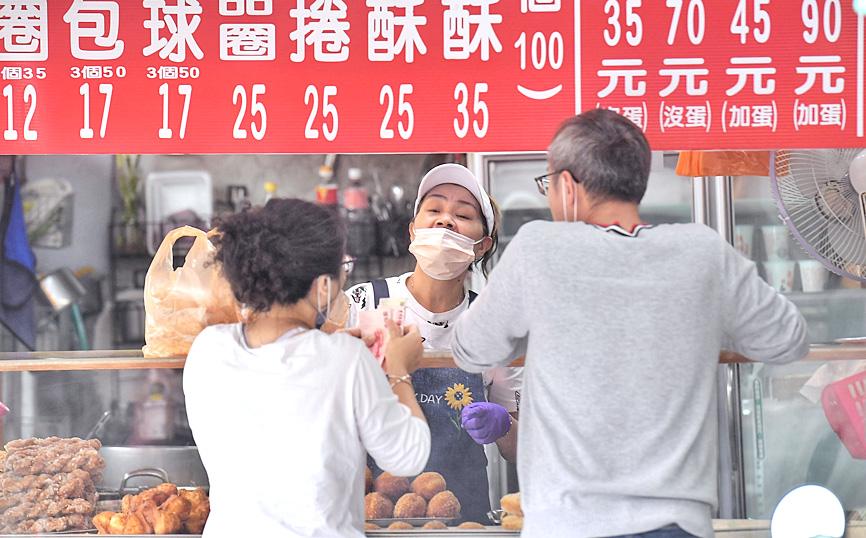Confidence in the local economy weakened due to geopolitical concerns surrounding Russia’s invasion of Ukraine, and a rate hike cycle launched by the world’s major central banks, a survey by Cathay Financial Holdings Co (國泰金控) showed on Wednesday.
The survey of 19,590 Cathay Life Insurance Co (國泰人壽) and Cathay United Bank (國泰世華銀行) clients conducted from April 1 to 7 showed that 46.4 percent of respondents believed the local economic situation would deteriorate over the next six months, while 29.9 percent thought it would improve.
The economic optimism index for the next six months stands at minus-16.5 this month, down from minus-1.7 from last month.

Photo: CNA
The optimism index for the current economic climate also moved lower to minus-16 this month from minus-0.2 last month, the survey showed.
Cathay Financial said that Russia’s invasion of Ukraine, which began on Feb. 24, has created uncertainty in the global economy.
Decisions by central banks to tighten monetary policies and retrieve funds from markets had also cast a shadow.
The war in Ukraine has resulted in sanctions being imposed against Moscow, a move that has sent ripples through global agricultural and commodity markets, adding upward pressure to inflation, Cathay Financial said.
The US Federal Reserve last month announced the first of several expected rate hikes by raising its key interest rate by 25 basis points, and hinted at six further increases to follow, with 50 basis points proposed for its meeting next month.
Taiwan’s central bank followed the Fed by raising interest rates by 25 basis points last month, its first increase in more than 10 years.
Cathay Financial said that a spike in domestically transmitted COVID-19 cases had additionally dampened consumers’ willingness to spend, leading to a fall in confidence in the local economy in this month’s survey.
As a result, the index gauging willingness to purchase big-ticket items, such as vehicles, fell sharply to zero from 10.8 last month.
The index assessing the willingness to buy property also dropped from minus-46 to minus-52.1, its lowest since May 2019, reflecting the effect of the central bank’s rate hike.
The employment optimism index for the next six months fell to minus-15.8 from minus-4.9 last month, while the index gauging the state of the job market also moved lower to minus-12.1 from minus-6.1.
The downbeat sentiment spread to the stock market, with the optimism index for share prices falling to 2.9 from 8.1, while the index gauging investors’ willingness to take risks also dropped to 12.0 from 15.0.
The latest survey found that respondents estimated Taiwan’s economic growth would hit 3.3 percent this year, down from 3.36 in last month’s survey, with 81 percent expecting economic growth of 2 percent or higher.
In the survey, 27.7 percent of respondents were concerned that growing global inflationary pressure would undermine demand and hurt Taiwan’s export-oriented economy, while 22.1 percent expressed concern that an increase in local COVID-19 cases would slow economic growth.

UNCERTAINTY: Innolux activated a stringent supply chain management mechanism, as it did during the COVID-19 pandemic, to ensure optimal inventory levels for customers Flat-panel display makers AUO Corp (友達) and Innolux Corp (群創) yesterday said that about 12 to 20 percent of their display business is at risk of potential US tariffs and that they would relocate production or shipment destinations to mitigate the levies’ effects. US tariffs would have a direct impact of US$200 million on AUO’s revenue, company chairman Paul Peng (彭雙浪) told reporters on the sidelines of the Touch Taiwan trade show in Taipei yesterday. That would make up about 12 percent of the company’s overall revenue. To cope with the tariff uncertainty, AUO plans to allocate its production to manufacturing facilities in

TAKING STOCK: A Taiwanese cookware firm in Vietnam urged customers to assess inventory or place orders early so shipments can reach the US while tariffs are paused Taiwanese businesses in Vietnam are exploring alternatives after the White House imposed a 46 percent import duty on Vietnamese goods, following US President Donald Trump’s announcement of “reciprocal” tariffs on the US’ trading partners. Lo Shih-liang (羅世良), chairman of Brico Industry Co (裕茂工業), a Taiwanese company that manufactures cast iron cookware and stove components in Vietnam, said that more than 40 percent of his business was tied to the US market, describing the constant US policy shifts as an emotional roller coaster. “I work during the day and stay up all night watching the news. I’ve been following US news until 3am

Taiwan will prioritize the development of silicon photonics by taking advantage of its strength in the semiconductor industry to build another shield to protect the local economy, National Development Council (NDC) Minister Paul Liu (劉鏡清) said yesterday. Speaking at a meeting of the legislature’s Economics Committee, Liu said Taiwan already has the artificial intelligence (AI) industry as a shield, after the semiconductor industry, to safeguard the country, and is looking at new unique fields to build more economic shields. While Taiwan will further strengthen its existing shields, over the longer term, the country is determined to focus on such potential segments as

COLLABORATION: Given Taiwan’s key position in global supply chains, the US firm is discussing strategies with local partners and clients to deal with global uncertainties Advanced Micro Devices Inc (AMD) yesterday said it is meeting with local ecosystem partners, including Taiwan Semiconductor Manufacturing Co (TSMC, 台積電), to discuss strategies, including long-term manufacturing, to navigate uncertainties such as US tariffs, as Taiwan occupies an important position in global supply chains. AMD chief executive officer Lisa Su (蘇姿丰) told reporters that Taiwan is an important part of the chip designer’s ecosystem and she is discussing with partners and customers in Taiwan to forge strong collaborations on different areas during this critical period. AMD has just become the first artificial-intelligence (AI) server chip customer of TSMC to utilize its advanced